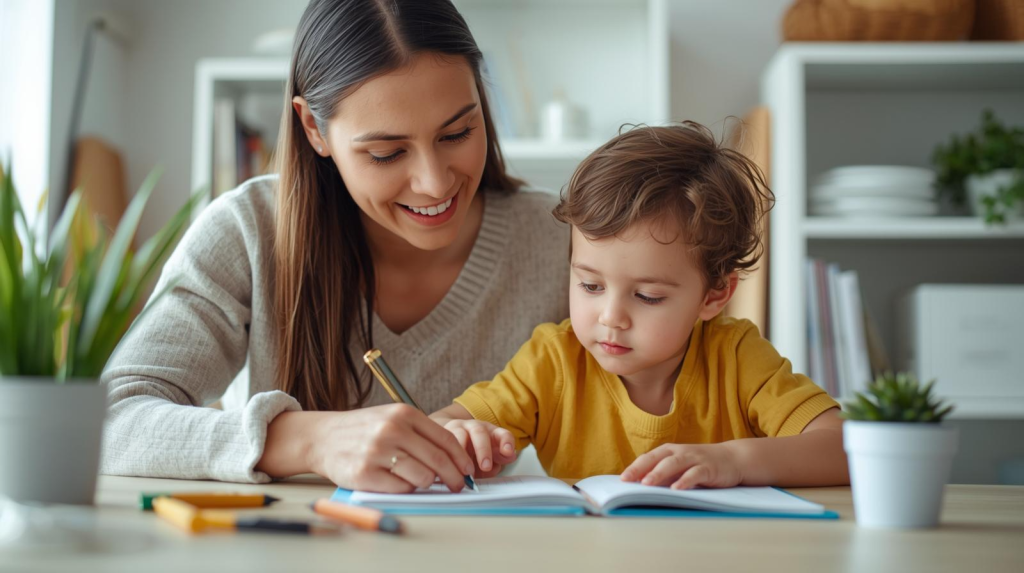This article explores the balance between quality and quantity in parenting time, revealing insights on fostering stronger relationships with children.

In the world of parenting, the debate over quality versus quantity of time spent with children is ongoing. Many parents grapple with the notion that simply being present isn’t enough; it’s about how they engage during that time. Research shows that meaningful interactions can significantly impact a child’s development. Thus, understanding how to effectively utilize parenting time can lead to stronger bonds and healthier emotional connections.
Key Takeaway
- Quality interactions during parenting time are crucial for child development.
- Balancing time spent with children can enhance emotional connections and reduce parenting stress.
- Effective use of parenting time fosters strong parent-child relationships and promotes overall well-being.
The Importance of Quality Time

When discussing parenting, one often hears the phrase “quality time.” This concept emphasizes the importance of engaging meaningfully with children rather than just being physically present. Quality time can involve activities like reading together, playing games, or simply having deep conversations. These moments create emotional connections that are vital for a child’s development.
Research indicates that children thrive when they experience focused interactions with their parents. For instance, a study might show that children who engage in regular, meaningful conversations with their parents tend to have better communication skills and emotional intelligence. This suggests that the depth of interaction often outweighs the sheer amount of time spent together.
The Role of Quantity in Parenting
On the flip side, quantity also matters. The amount of time parents spend with their children can influence their well-being. For instance, children who have more time with their parents often feel more secure and supported. They develop a sense of belonging, which is crucial during formative years.
However, it’s essential to recognize that simply being around isn’t enough. If the time spent is filled with distractions—like phones or television—then the benefits diminish. Therefore, while quantity is important, it should not come at the expense of quality.
Finding the Balance
So, how can parents strike the right balance? It starts with intentionality. Parents should aim to create routines that incorporate both quality and quantity. This might mean setting aside specific times for family activities, such as game nights or outdoor adventures, while also ensuring that everyday moments, like dinner conversations, are meaningful.
One practical approach is to schedule “focused parenting moments.” These are times when parents put away distractions and fully engage with their children. This could be as simple as a walk in the park or cooking dinner together. The key is to be present and involved, fostering an environment where children feel valued and heard.
The Impact of Parenting Time on Child Development
The impact of parenting time on child development cannot be overstated. Studies have shown that children who experience high-quality interactions with their parents tend to perform better academically and socially. They are more likely to develop strong emotional regulation skills, which can lead to healthier relationships in the future.
Moreover, effective parenting time can reduce stress for both parents and children. When parents feel they are making meaningful connections, they often report lower levels of anxiety and frustration. This creates a positive feedback loop where both parties benefit from the time spent together.
Parenting Time During Adolescence
As children grow into adolescence, the dynamics of parenting time shift. Teenagers often seek independence, which can lead to a decrease in quantity of time spent with parents. However, this doesn’t mean that quality should be neglected. Engaging in open conversations and showing interest in their lives can help maintain strong connections.
Adolescents benefit from parental involvement, even if it looks different than it did in childhood. Parents might find that attending their teen’s events or simply checking in regularly can foster a sense of support and understanding.
Building Strong Parent-Child Relationships

Building strong relationships with children requires effort and consistency. Parents should strive to create an environment where children feel comfortable expressing themselves. This can be achieved through active listening and validating their feelings.
Shared family activities can also strengthen bonds. Whether it’s a weekend hike or a movie night, these experiences create lasting memories and reinforce the importance of family.
Effective Use of Parenting Time
To make the most of parenting time, parents should consider their own schedules and commitments. Time management is crucial. Setting priorities and being intentional about family time can lead to more meaningful interactions.
For example, if a parent has a busy work schedule, they might plan a special outing on weekends. This allows for both quality and quantity, as the child looks forward to these dedicated moments together.
The Emotional Connection in Parenting
The emotional connection between parent and child is fundamental to healthy development. Parents who invest time in understanding their children’s emotions and needs foster a sense of security. This connection can lead to better communication and trust, which are essential for navigating challenges together.
Parents should also be aware of their own emotional states. Parenting can be stressful, and it’s important to manage that stress to ensure quality interactions. Taking time for self-care can help parents be more present and engaged when spending time with their children.
Conclusion
In the end, rethinking parenting time is about finding a balance that works for both parents and children. It’s not just about how much time is spent together, but how that time is used. By focusing on quality interactions and being intentional with their time, parents can foster strong relationships that support their children’s development and well-being.
Ultimately, the goal is to create a nurturing environment where children feel loved and valued. This can lead to healthier emotional connections, reduced stress, and a more fulfilling parenting experience. So, take a moment to reflect on your own parenting time. Are you making the most of it?
FAQ
I only see my child for an hour before bed on weekdays. Does that make me a bad parent?
Not at all. What matters most is what happens during that hour. If you’re fully present—putting away your phone, engaging in conversation, reading together, or just connecting—that hour can be incredibly meaningful. Many working parents face similar constraints, and children can thrive with shorter but high-quality interactions. The key is being intentional and focused during the time you do have, rather than just being physically present while distracted. Your child will remember that you were truly with them, not just how many hours you clocked.
How do I make time “quality time” when I’m exhausted after work?
Quality doesn’t require high energy or elaborate activities. Sometimes the most meaningful moments are quiet ones—lying next to your child while they talk about their day, doing a simple puzzle together, or just being present during bathtime. Lower your expectations about what quality time should look like. It’s about connection, not performance. If you’re too exhausted for active play, that’s okay—emotional presence matters more than entertainment value. Even admitting “I’m tired tonight, but I want to hear about your day” models authenticity.
My ex claims I don’t spend enough time with our kids. How do I handle this guilt?
This is a common source of parental guilt, especially in separated families. First, separate legitimate concerns from criticism meant to make you feel bad. If your kids are happy, healthy, and securely attached to you, then the time you’re spending is likely sufficient. Focus on making your time together meaningful rather than defending the quantity. That said, if you genuinely feel you’re not seeing your kids enough and it’s affecting your relationship, explore whether adjustments are possible. But don’t let someone else’s judgment override your own assessment of your relationship with your children.
Is it really possible to have “quality time” with multiple kids at once, or do I need one-on-one time with each?
Both have value. Family time where everyone is together creates shared experiences and sibling bonds. But individual attention also matters—each child needs to feel seen and valued as an individual. You don’t need elaborate one-on-one outings; even 15 minutes of focused attention per child can be powerful. This might look like one child helping you cook while another is occupied, or reading separately with each child at bedtime. Find small pockets throughout the week rather than trying to create equal, extensive one-on-one experiences constantly.
My teenager barely wants to spend time with me. How can I create quality time when they’re always in their room?
Teenagers’ pulling away is developmentally normal, not a reflection of your relationship’s quality. Quality time with teens often looks different—it might be car rides where they open up when not making eye contact, being available when they do want to talk (even if it’s late at night), or showing interest in their world without being intrusive. Don’t force activities they’ve outgrown. Instead, find entry points into their interests, respect their need for space while remaining available, and take whatever connection they offer, even if brief.
I feel like I’m always multitasking. Does it count as quality time if I’m half-listening while making dinner?
Honestly, no—that’s the kind of quantity without quality the article addresses. However, you can transform these moments by shifting your approach. Instead of dividing attention, involve your child in the task. Cooking together, folding laundry while talking, or doing chores side-by-side can become quality time when you’re genuinely engaged in conversation. The goal isn’t eliminating productivity but finding ways to connect within necessary tasks rather than treating them as competing priorities.
What if I actually enjoy having time away from my kids? Does that mean I’m not prioritizing quality time?
Wanting time away from your kids is completely normal and healthy. You don’t need to cherish every moment or feel guilty about needing breaks. In fact, time apart often makes the time together better because you’re refreshed and more capable of being present. Quality time is about what happens when you are together, not about never wanting space. Parents who acknowledge their own needs and take care of themselves often show up better for their children during shared time.
My partner spends less time with the kids but makes a big deal about “quality time” when they do. Am I wrong to feel resentful?
Your feelings are valid. There can be an imbalance where one parent handles the daily grind (which isn’t always high-quality interaction) while the other swoops in for fun activities. Both roles are necessary, but it’s worth discussing with your partner. The parent doing daily care work also needs opportunities for enjoyable, connected time, not just managing logistics. Have an honest conversation about sharing both the mundane responsibilities and the rewarding moments more equitably.
Can screens ever be part of quality time, or should they always be put away?
Context matters. Watching a show together and discussing it, playing a video game cooperatively, or looking at photos can be quality time if you’re engaged together. The issue isn’t screens themselves—it’s parallel screen use where everyone is on their own device. A family movie night where you’re sharing the experience is different from everyone scrolling on phones. The key question is: are we connecting through this activity, or is it preventing connection?
I have so little time with my kids that I hate wasting it on discipline or conflict. Should I let things slide?
Quality time doesn’t mean only pleasant time. Addressing behavior, setting boundaries, and working through conflicts are part of quality parenting. In fact, avoiding necessary discipline because you’re worried about limited time can create bigger problems and more distance. The goal is handling these moments constructively—calmly discussing what went wrong, listening to their perspective, and problem-solving together. These interactions, while challenging, show your child you care enough to guide them, which strengthens your relationship long-term.
References
- https://rcfamilies.com/2021/05/quality-vs-quantity-time-does-it-really-matter-when-it-comes-to-your-kids.html/
- https://www.washingtonpost.com/local/making-time-for-kids-study-says-quality-trumps-quantity/2015/03/28/10813192-d378-11e4-8fce-3941fc548f1c_story.html







